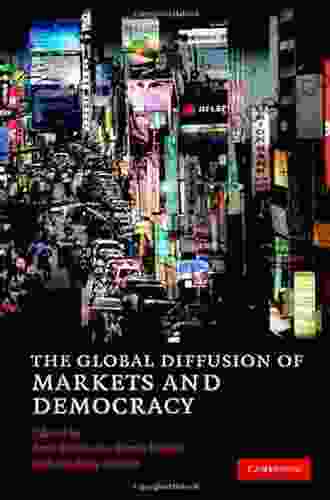The Global Diffusion of Markets and Democracy: A Comprehensive Examination of Intersecting Trajectories

The late 20th and early 21st centuries have witnessed a profound transformation in the global landscape, characterized by the twin processes of market liberalization and democratic expansion. These parallel trajectories have had a profound impact on societies around the world, shaping economic structures, political systems, and social norms. This article explores the intricate relationship between the global diffusion of markets and democracy, tracing their intertwined evolution and examining the ways in which they have influenced and shaped one another.
4.1 out of 5
| Language | : | English |
| File size | : | 14704 KB |
| Text-to-Speech | : | Enabled |
| Screen Reader | : | Supported |
| Enhanced typesetting | : | Enabled |
| Word Wise | : | Enabled |
| Print length | : | 589 pages |
| Lending | : | Enabled |
The Rise of Global Markets
The globalization of markets has its roots in the post-World War II period, when the Bretton Woods system established a framework for international economic cooperation. The subsequent decades saw a gradual dismantling of trade barriers, the emergence of multinational corporations, and the development of global financial markets. These developments facilitated the flow of goods, capital, and ideas across borders, leading to increased economic interdependence and the creation of a globalized economy.
The rise of global markets has had a transformative impact on economic development. It has spurred economic growth by promoting competition, increasing efficiency, and expanding access to new markets. However, it has also brought challenges, such as widening income inequality, job displacement, and environmental degradation.
The Spread of Democracy
In parallel with the globalization of markets, the late 20th century witnessed a wave of democratization, with numerous authoritarian regimes transitioning to more open and participatory political systems. This trend was driven by a variety of factors, including rising levels of education and economic development, the spread of democratic ideas through global media, and the pressure from international organizations and civil society groups.
The spread of democracy has had a profound impact on political systems and social norms. It has empowered citizens, fostered greater transparency and accountability, and protected human rights. However, it has also faced challenges, such as the rise of populism, the erosion of political institutions, and the backsliding of established democracies.
The Intersecting Trajectories
The global diffusion of markets and democracy have intersected in complex and multifaceted ways. On the one hand, economic liberalization has stimulated economic growth, which in turn has provided a foundation for political liberalization. The spread of markets has also exposed citizens to new ideas and values, fostering a greater demand for political participation and accountability.
On the other hand, the spread of democracy has shaped the trajectory of market liberalization. Democratic governments are more likely to adopt policies that promote social welfare and protect the environment. They are also more likely to regulate the activities of multinational corporations and ensure that the benefits of globalization are shared more equitably.
Impact on Economic Development
The relationship between markets and democracy has had a significant impact on economic development. Economic liberalization has stimulated growth by increasing competition, attracting foreign investment, and fostering innovation. However, it has also led to increased inequality and environmental degradation. Democratic governments have played a role in mitigating these negative effects by implementing social welfare programs, protecting labor rights, and regulating the activities of businesses.
Impact on Political Transformation
The spread of democracy has had a profound impact on political transformation around the world. It has empowered citizens, fostered greater transparency and accountability, and protected human rights. However, it has also faced challenges, such as the rise of populism, the erosion of political institutions, and the backsliding of established democracies. The relationship between markets and democracy has influenced the trajectory of political transformation, with democratic governments more likely to adopt policies that promote social welfare and protect the environment.
Impact on Social Change
The diffusion of markets and democracy has also had a significant impact on social change. Economic liberalization has led to increased urbanization, the growth of the middle class, and the spread of consumer culture. Democratic governments have played a role in promoting social mobility, gender equality, and access to education and healthcare. However, the relationship between markets and democracy has also contributed to social polarization, the decline of traditional values, and the rise of individualism.
The global diffusion of markets and democracy has been one of the defining features of the late 20th and early 21st centuries. These parallel trajectories have had a profound impact on societies around the world, shaping economic structures, political systems, and social norms. The relationship between markets and democracy is complex and multifaceted, with both positive and negative consequences. Understanding this relationship is essential for navigating the challenges and opportunities of globalization and democratic governance.
4.1 out of 5
| Language | : | English |
| File size | : | 14704 KB |
| Text-to-Speech | : | Enabled |
| Screen Reader | : | Supported |
| Enhanced typesetting | : | Enabled |
| Word Wise | : | Enabled |
| Print length | : | 589 pages |
| Lending | : | Enabled |
Do you want to contribute by writing guest posts on this blog?
Please contact us and send us a resume of previous articles that you have written.
 Top Book
Top Book Novel
Novel Fiction
Fiction Nonfiction
Nonfiction Literature
Literature Paperback
Paperback Hardcover
Hardcover E-book
E-book Audiobook
Audiobook Bestseller
Bestseller Classic
Classic Mystery
Mystery Thriller
Thriller Romance
Romance Fantasy
Fantasy Science Fiction
Science Fiction Biography
Biography Memoir
Memoir Autobiography
Autobiography Poetry
Poetry Drama
Drama Historical Fiction
Historical Fiction Self-help
Self-help Young Adult
Young Adult Childrens Books
Childrens Books Graphic Novel
Graphic Novel Anthology
Anthology Series
Series Encyclopedia
Encyclopedia Reference
Reference Guidebook
Guidebook Textbook
Textbook Workbook
Workbook Journal
Journal Diary
Diary Manuscript
Manuscript Folio
Folio Pulp Fiction
Pulp Fiction Short Stories
Short Stories Fairy Tales
Fairy Tales Fables
Fables Mythology
Mythology Philosophy
Philosophy Religion
Religion Spirituality
Spirituality Essays
Essays Critique
Critique Commentary
Commentary Glossary
Glossary Bibliography
Bibliography Index
Index Table of Contents
Table of Contents Preface
Preface Introduction
Introduction Foreword
Foreword Afterword
Afterword Appendices
Appendices Annotations
Annotations Footnotes
Footnotes Epilogue
Epilogue Prologue
Prologue Sir Reed A Lot
Sir Reed A Lot Ivan Illich
Ivan Illich Ahmed Masoud
Ahmed Masoud Laura Lohmann
Laura Lohmann Sam Kaplan
Sam Kaplan Agnolo Firenzuola
Agnolo Firenzuola Agnieszka Bates
Agnieszka Bates Ben Orlin
Ben Orlin Nathalie Taghaboni
Nathalie Taghaboni Eminent Paul Sokomba
Eminent Paul Sokomba Agustina Bazterrica
Agustina Bazterrica Colleen Murphy
Colleen Murphy Aidan Brophilius
Aidan Brophilius Stefania Patinella
Stefania Patinella Phyllis Stoffman
Phyllis Stoffman Brandon Mcmillan
Brandon Mcmillan Carl Sandburg
Carl Sandburg Marie Orwell
Marie Orwell Brendan Galvin
Brendan Galvin Curt Dudley Marling
Curt Dudley Marling
Light bulbAdvertise smarter! Our strategic ad space ensures maximum exposure. Reserve your spot today!

 Jackson HayesGet More Leads and Make More Money Using Social Media Online: A Comprehensive...
Jackson HayesGet More Leads and Make More Money Using Social Media Online: A Comprehensive... José MartíFollow ·19.7k
José MartíFollow ·19.7k Timothy WardFollow ·7.7k
Timothy WardFollow ·7.7k Carlos DrummondFollow ·2.9k
Carlos DrummondFollow ·2.9k Clarence MitchellFollow ·11k
Clarence MitchellFollow ·11k Quentin PowellFollow ·13.2k
Quentin PowellFollow ·13.2k Andy HayesFollow ·10.7k
Andy HayesFollow ·10.7k Edward ReedFollow ·15.8k
Edward ReedFollow ·15.8k Charles ReedFollow ·3.8k
Charles ReedFollow ·3.8k

 Ignacio Hayes
Ignacio HayesShipwrecked For 13 Days On Coral Reef: A Tale of Survival...
In the vast expanse of the...

 Gerald Parker
Gerald ParkerWhere the World Is Quiet: Delving into a Realm of Serene...
A Tapestry of Serenity In the tapestry...

 Charles Bukowski
Charles BukowskiPloughshares Winter 2009: Guest Edited by Tony Hoagland
Ploughshares...

 Rubén Darío
Rubén DaríoAnthology of Massachusetts Poets: William Stanley...
William Stanley...

 Jason Hayes
Jason HayesSean Kenney's Mesmerizing Robot Masterpieces: A Journey...
In a realm where imagination meets...

 Terence Nelson
Terence NelsonUnveiling the Elite Force: The Commander Men of Hidden...
In the shadows of society, where justice...
4.1 out of 5
| Language | : | English |
| File size | : | 14704 KB |
| Text-to-Speech | : | Enabled |
| Screen Reader | : | Supported |
| Enhanced typesetting | : | Enabled |
| Word Wise | : | Enabled |
| Print length | : | 589 pages |
| Lending | : | Enabled |










